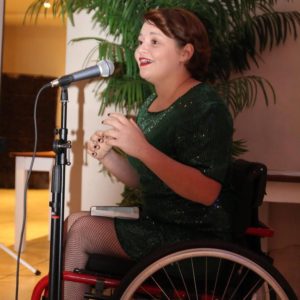 “Can I ask you a question?”
“Can I ask you a question?”
“Of course,” I replied, refocusing my attention across the hospital bed to answer my patient’s inquisitive, middle aged son.
“Are you a real Doctor? Like, can you prescribe drugs and stuff?”
This question wasn’t asked because I look particularly young. I’m 29, and have for too long neglected my skincare regime. I look 29. But I’m still asked for a slightly different reason. I practise medicine in a wheelchair.
“Ruby” the chair has been a part of my life for a year now, thanks to my mangling my knees prior to a diagnosis of Ehlers-Danlos Syndrome. Ruby appeared in my final year of medical school, and it’s thanks to her that I can work full time and take far fewer medications for the chronic pain I now experience.
On the whole, patients and their families are often unphased by my rolling up, stethoscope around my neck, but the occasional comment and question still arises.
“You’re a doctor? Well, aren’t you doing well?!”
“Can I get a wheelchair like that?”
“Any chance of a lift, Doc?”
And this classic from a slightly confused patient: “What’s wrong with my doctor?!”
Well, I’m very untidy and quite disorganised . . .
I have learnt that patients often like to enquire about my health. Whether they view the chair as an equaliser or simply as a sign that I have probably been on their side of the stethoscope too, many want to take a moment to acknowledge it, which is fine by me (after all, a red wheelchair with light-up front wheels is pretty hard to ignore!). I generally explain that my joints don’t always behave so I find it easier to work in a wheelchair, and then we quickly move back onto their case.
Occasionally, I stand up out of my chair to examine a patient or perform a procedure. I learnt swiftly that it is best to warn the patient with a “I’m just going to stand up out of my chair, you stay right where you are, I won’t fall over.” Without a warning, I can receive some slightly terrified looks, or more often a joker will yell, “It’s a miracle!”
It’s not only patients I have to warn. I once hobbled from my chair into a room where a big team were working to stabilise a patient. A nurse I knew turned round, gave me a look of total shock, and an “Oh my God!”
“I’m so sorry,” he quickly apologised, “I just never knew you could stand up.”
Working in a healthcare setting in a wheelchair can lend some unique perspectives and, I believe, improve things for our patients. An occasional patient may not take the time to point out those things that could make their experiences so much easier. Frankly, if people with disabilities pointed out every problem they encounter, they’d not have time for anything else. I try to highlight these issues, to improve things for all of us. For example, I am yet to find a disabled toilet in a hospital that doesn’t have pedal bins. Funnily enough, my wheelchair using friends and I generally find using these a bit of a challenge.
Working with chronic pain is also an issue, particularly when I have flare-ups. When I recently partially dislocated my arm, I couldn’t push my chair and had to work with a crutch. It looked to all as if I was having a “good day.” It’s hard to admit to your colleagues that you’re struggling, particularly when everyone else isn’t exactly finding their workload easy to handle. Am I causing myself more health problems for the future? Probably. But I simply can’t afford to live in London, pay rent, run the car I rely on, and work less than full time.
There is joy in how I work, however. One patient struggling with a chronic health condition recently reached forward and took my hands in hers.
“See Doc, I know you get it. You’re like me. You’re different too.”
Yes, I am. And if my “difference” helps people like her, I’m alright with that.
Hannah Barham-Brown is a foundation doctor based in south London. She tweets @HannahPopsy, blogs for the Huffington Post, and runs her own blog Wonky Medicine.
Competing interests: Hannah Barham-Brown sits on the Equality, Diversity, and Inclusion Advisory Group of the BMA, along with the Junior Doctors Committee, and the Medical Ethics Committee.
